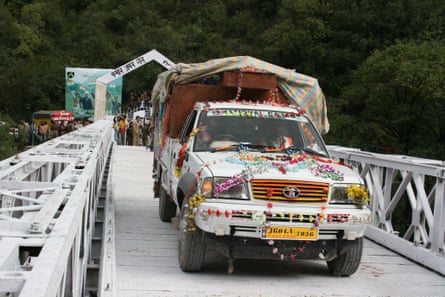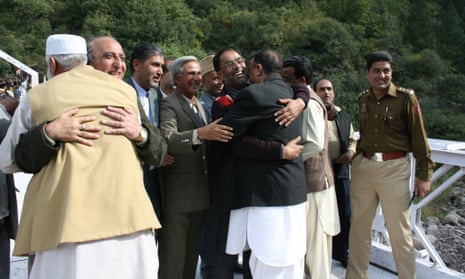A highly militarised zone divides the erstwhile state of Jammu and Kashmir between Indian and Pakistani-administered territories. An intense period of violence and militancy beginning in 1989 left tens of thousands dead and many more displaced, until ceasefire between India and Pakistan was finally announced in 2003.
In 2008, in an attempt to build trust between the two sides, a line of control (the de facto border) was opened up for limited trade. It has provided an unprecedented opportunity for ex-combatants to start a new life.
Since 2009, Conciliation Resources’ Trading for Peace initiative has been working with local groups to create a practical reason for the two sides to work together. The project recently won the Bond development organisation’s positive collaboration award.
Conciliation Resources worked with business chambers, journalists and civil society to establish trade across the line of control (LoC). It has facilitated communication across the divide, provided technical expertise to local trade associations and informed governments about the needs on the ground.
The system in place is locally referred to as “blind trade”, because goods are exchanged for goods rather than money. The trust-building agreement between India and Pakistan allows the exchange of a limited list of 21 items under a zero tariff regime, recognising that the LoC is not an international border and trade is between two parts of Kashmir rather two countries.
After rigorous scrutiny at the trade facilitation centres, trucks carrying the permitted goods are allowed to cross, with the driver the only person accompanying the goods.
Uncertainty shrouds the process. “I was sending oranges and receiving carpets. Nobody knew anything,” says Zulfiqar Abassi, former president of the Joint Chamber of Commerce and Industries, an organisation formed to represent business across the LoC.

For the traders dispatching oranges with little to no knowledge of what they will get in return, the process represents something far greater than the monetary value of the goods. Intra-Kashmir trade has become a medium for restoring business and cultural relationships. The wider population on both sides, particularly the business community, has supported the cross-LoC trade and travel links. Motivated to rebuild the brutally severed connections between the divided people and land, more than 300 ex-combatants are involved in the trade.
Despite uncertainties about the future and the unresolved political questions which continue to hang over Kashmir, the ex-combatants have committed to a different approach. “The trade not only dramatically improved my livelihood but also reconnected me with my family and homeland, without having to compromise my political views,” says trader and ex-combatant Majid Khan.
As well as creating new possibilities for relationships – economic, cultural and even political – the trade is saving lives by deterring the Indian and Pakistani armies from combat in the areas where it takes place. Those opposed to the process argue that it is being used to cover over or replace the political dialogue. Yet these concerns have been allayed by the ex-combatants leading the trade saying that it does not negate or concede their political aspirations.
“This time is more significant than any time before,” says Zafar Choudhary, a policy analyst in India-administered Kashmir. “The local government in J&K (India-administered) wants to send a message about reviving the peace process and engaging Pakistan. Trade is the one activity that they can support. And so this is the moment to take things forward.”
Siddiq Wahid, a historian in India-administered Kashmir sums it up neatly: “Trade leads to the development of social relationships, which leads to emotional integration – which in turn leads to trust.”
The Trading for Peace initiative won Bond’s International Development Positive Collaboration award. Tahir Aziz is South Asia programme director for Conciliation Resources. Follow @CRbuildpeace on Twitter.
Join our community of development professionals and humanitarians. Follow@GuardianGDP on Twitter.

Comments (…)
Sign in or create your Guardian account to join the discussion